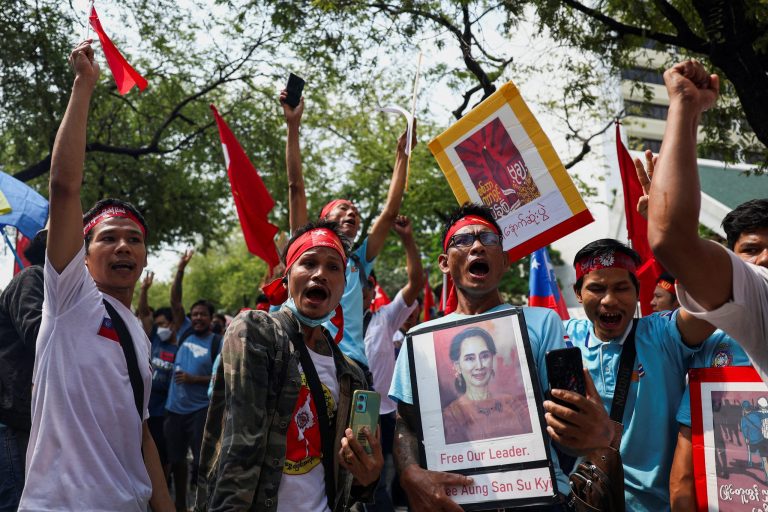Myanmar has had another terrible year in 2023. The economic, social and political damage wrought by the 2021 coup is compounded month after month by the decisions of a small group of top generals willing to stifle their country's hopes for a better future if it means they can stay in power.
Myanmar's population of 55 million has paid a heavy price for the decisions made by General Min Aung Hlaing. These decisions include removing Aung San Suu Kyi from power, arresting the president and government ministers, hounding resistance and crushing democratic prospects in a country that has already lost a great deal of economic and social development.
The severity of the violence means that millions of people suffer trauma and despair. Others have become radicalized, with a full commitment to destroying military rule. They see no hope for themselves or their children in a system in which the military feels entitled to destroy comprehensive political institutions on a whim.
On the battlefield, in 2023, Myanmar's armed groups have inflicted heavy losses on government forces, but they are still far from being outgunned. The generals in Naypyidaw, with their artillery, missiles and air force, are causing horrific damage throughout the country.
At a time when the wars in Eastern Europe and the Middle East are still raging, and where other potential flashpoints require continued attention, Myanmar has once again fallen off the list of strategic priorities. Even lightning attacks and territorial gains made by rebel groups since October 2023 have only slightly changed most strategic assessments.
Could this year be different? After three years of resistance and violence, the military regime has not yet been able to fully consolidate its power – it has no real friends at the international level, and China and Russia care only enough to achieve their financial and strategic goals. With morale at rock bottom, keeping enough regime forces and police in the fight is not a given. Perhaps more seriously, the wounds inflicted by the coup have led to a sharp deterioration of the local economy.
Increasingly stringent restrictions mean that even those who reluctantly agreed to the coup – and who perhaps expected a return to the good old days of stifling military dominance – are wondering whether there is any point in continuing a deeply worrying downward spiral towards authoritarian rule. abyss.
In 2023, broader regional security risks become more apparent. Myanmar has become the world's largest exporter of opium, adding to its long standing as a methamphetamine producer. The growing scourge of cyber scams hosted by Myanmar, some of which are located in border areas where Chinese crime syndicates thrive, raises another set of issues. A failed state is a driver of all kinds of problems.
With the generals in Naypyidaw now feeling more pressure than ever, with the battlefield changing rapidly, and with Myanmar more isolated than usual internationally, questions about what will happen next are beginning to receive more attention.
Planning for different scenarios is now wise. The first focus of discussion should be the future of Myanmar's many armed groups, including General Min Aung Hlaing's army that launched the 2021 coup.
As the country's dominant political institution since independence in 1948, it now faces a long list of alleged war crimes and is more concerned than ever about its security. It is difficult to imagine a negotiated settlement that could include the current military leadership. If Naypyidaw was attacked and in danger of being overrun, its last resort would be shameful exile.
so what? The biggest problems in any “day after” scenarios concern the equitable sharing of power and resources among the myriad groups that fought so hard to defeat the coup. Understandably, they are keen to carve out spheres of power, experiment with self-government, and secure a share of the country's vast resource wealth.
Thinking about Balkanizing the country, which many are reluctant to do, also means thinking more deeply about how these fractured societies might eventually be able to recover. Building institutions across multiple jurisdictions, including in any more flexible federal model, will be time-consuming and expensive.
This is where the hypothetical discussion about Myanmar's future has more serious consequences and deserves greater attention from abroad.
Its people fought hard for the chance to destroy the oppressive military apparatus. However, without a change of approach from the rest of the world, the reality is that the people of Myanmar will continue to fight, mostly alone.
If the military regime ultimately fails – meaning the coup plotters have their backs to the wall – the hard work of the people of Myanmar will continue, including across often competing ethnic, religious, and ideological lines. Those who emerge to the top will need strong international backers.
While the people of Myanmar should have every opportunity to determine their future, in any “day after” scenarios, ASEAN and other international actors must quickly and proactively step up their efforts.
Democratic partners, such as Australia and Japan, should be ready to help with resources and cooperative ambition. The costs and other requirements of developing a serious plan to support Myanmar after the current disaster will be enormous, and Myanmar's democrats need all the friends they can get.
Nicholas Farrelly is Professor and Vice-Chancellor of the University of Tasmania.
This article is part of EAF series special features In 2023 under review and next year.

